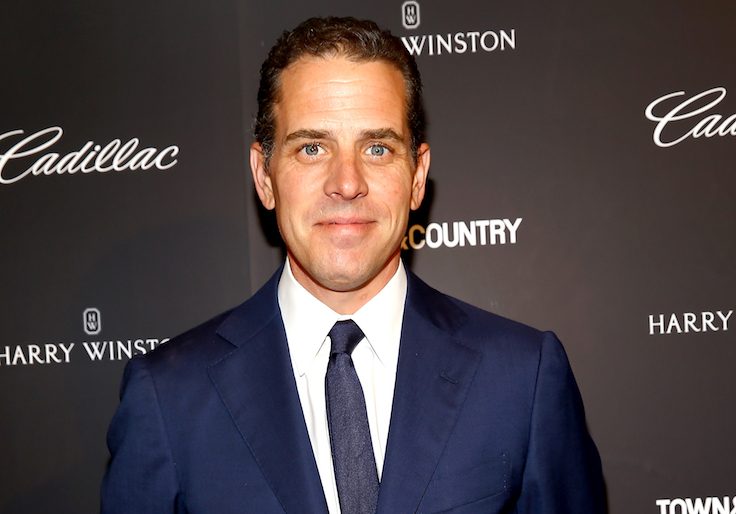It wasn't just Ukraine. A U.S. senator is now investigating whether Hunter Biden improperly benefited from his business ties to a Chinese investment firm that has partnered with a Chinese-backed aviation company keen on stealing U.S. national security secrets. Senate Finance Committee chairman Chuck Grassley (R., Iowa) received a classified briefing about the foreign investment deal on Friday, the Washington Free Beacon has learned.
The Aviation Industry Corporation of China had raised national security concern in the U.S. before. American national security officials and independent analysts strongly suspected that the company, a major supplier of military jets in China, had hacked U.S. networks to steal the design of the F-35 jet and used the design to build its own stealth jet fighters.
In 2015, the Chinese aviation giant partnered with BHR Partners, a state-backed Chinese equity firm, to acquire Henniges Automotive, a U.S. auto company that produces technologies with military applications. Biden has sat on BHR's board since 2013. The $600 million acquisition was one of the largest by a Chinese company of a U.S.-based auto company.
Officials from the Treasury Department, Commerce Department, and the Office of the Director of National Intelligence gave Grassley an "extensive, classified briefing," according to Michael Zona, Grassley's communications director.
"Chairman Grassley intends to review additional material and will contact the agencies with follow-up questions in the coming weeks," Zona said. While he declined to comment on the substance of Friday's briefing, citing its classified nature, Zona said the senator would have more to say at a "later date."
Grassley initially raised concerns about the deal in an August letter, pointing to potential Obama-era conflicts of interest. The State Department, then led by John Kerry, had to approve the deal. Kerry's stepson, Christopher Heinz, worked side by side with Biden at another investment firm. Biden's father, Joe Biden, was the vice president at the time the deal was approved. Grassley has requested detailed information about how the deal was approved, what role White House personnel played in the decision, and whether they followed proper procedure.
"There is cause for concern that potential conflicts of interest could have influenced CFIUS approval of the Henniges transaction," Grassley wrote in the letter. CFIUS is the interagency committee that determines whether a foreign investment in the United States is a national security risk. "Accordingly, Congress and the public must fully understand the decision-making process that led to the Henniges approval and the extent to which CFIUS fully considered the transaction's national security risks."
While Biden's lawyer said his client has not made a dime off of his business relationship with BHR Partners, government watchdogs aren't buying it.
"I'm going to guess Hunter Biden has had the opportunity to trade in on his name in the United States," said Scott Amey, general counsel at the nonprofit watchdog Project on Government Oversight. "And it really is questionable to cash in with foreign governments, especially those that have an adversarial approach and philosophy to the United States."
Biden has acknowledged, through his lawyer, that he invested $420,000 in BHR to purchase a 10 percent stake in the fund in 2017. As long as Biden retains his stake, he stands to profit from the company's performance. Amey said that while many people make money lobbying for U.S. clients, Biden crossed a line by working with a hostile foreign country, calling his decision to pursue a business deal with China "a head scratcher" that "raises serious questions about his decision making process."
The details of the younger Biden's business dealings in China were first reported by Peter Schweizer in his book and confirmed by the Free Beacon. An attorney for Biden did not return request for comment.
President Donald Trump has repeatedly drawn attention to Biden's business dealings in Ukraine and China. He has openly called on the Chinese government to investigate the son of the Democratic presidential frontrunner, a move that drew condemnation from Democrats and Republicans alike. Biden said he would step down from the BHR board by the end of October, but it remains unclear whether he will continue to hold a financial stake in the private equity company.
"When Hunter engaged in his business pursuits, he believed that he was acting appropriately and in good faith," Biden's attorney, George Mesires, said in a statement. "He never anticipated the barrage of false charges against both him and his father by the president of the United States."
James Carafano, vice president of the Davis Institute for National Security and Foreign Policy at the conservative Heritage Foundation, said that Chinese companies routinely recruit influential U.S. nationals onto their boards to "advocate for China."
"It's much more likely that they would recruit a general or admiral or business executive to advocate for China than to use them to spy for China," he said.
By leveraging its close ties to both the United States and Chinese state entities, BHR aimed to raise up to $1.5 billion from American and Chinese investors, according to an archived version of its website. The Bank of China, one of the largest state banks in the country, remained the company's largest indirect shareholder three years after incorporation, and BHR's portfolio continues to invest heavily in Chinese state-owned enterprises, according to the company's website.
While Biden's attorney claims that "Hunter always understood that his father would be guided, entirely and unequivocally, by established U.S. policy, irrespective of its effects on Hunter's professional interests," the younger Biden nonetheless set up a 2013 meeting between his father and BHR CEO Jonathan Li while the vice president was visiting Chinese president Xi Jinping.
The Biden campaign did not return request for comment.
Correction: This article incorrectly stated that Christopher Heinz stood to benefit directly from BHR's deal with the Aviation Industry Corporation of China. In fact, Heinz was a business partner of Hunter Biden's at the investment firm Rosemont Seneca Partners, which did not invest in the Chinese deal. We regret the error.
